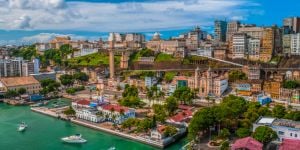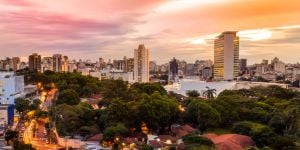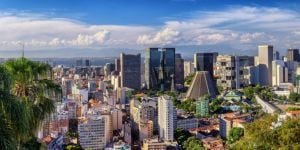Best plan of action?
Hi all!
I’ve been married to a Brazilian national for 12+ years. In fact we got married in Brazil and have our original marriage license etc. We lived there for 3 years when first married but have been in the US (my home country) ever since. During our time living there, I had applied for permanent residency and had my initial protocolo for my Carteira de trabalho- both now expired.
Now my husband and 2 children have dual citizenship and I’m the odd one out!
We have the opportunity to move the family back to Brazil and I may have royally messed up. Looking for some advice here as we are supposed to fly in a week.
My company was so kind to allow me to keep my job in a sort of hybrid way. They contracted a 3rd party (a professional employment organization with a branch in Brazil) to rehire me and comply with local requirements.
I didn’t plan ahead and apply for a work visa because honestly I assumed I could just start back up where I left off, and the company didn’t set up sponsorship.
What’s my best bet here? Can I enter Brazil on my passport and then immediately apply to reinstate my permanent residency and apply for the viper through my marriage and having two Brazilian-American children?
Do I even need to consider the Viper?
Through my status of marriage can I just set up an appointment with the federal police and apply for residency, my work card, and be good to go with my job? I’m very nervous about having a long lapse of time during which I’m not eligible to work due to documentation.
Please help! I’m losing sleep!
01/14/21
Welcome! Don't lose sleep -- you haven't really screwed anything up. Things have changed a lot in the past twelve years, including the old Law of Foreigners, which was replaced with a whole new Law of Migration in 2017. But two things haven't changed: your husband and kids have the right to have you with them in Brazil, and you (eventually) will have the right to work.
So, the first question is, when do you plan to come to Brazil? If it won't be for a month or more, consider getting a VITEM XI, the temporary visa for family unification, at the Brazilian Consulate responsible for your state. VIPER was abolished by the new Law (although old VIPERs continued to be in effect), and the VITEM XI largely replaced it. You should have no problem getting it, especially with your Brazilian Marriage Certificate, and the other documents that you'll need to obtain it you'll also be able to use with the Federal Police when you request your Residence Card, your CRNM. VITEM XI is good for a year, but you should have your CRNM well before that.
If your schedule is too tight for that, you CAN come on a tourist visa waiver (in effect, an electronic visa). That only gives you 90 days, plus one 90 day extension, so you should have all the necessary documents with you and plan on registering with the Federal Police ASAP after your arrival. Unfortunately, the pandemic has messed up most Federal Police schedules, and so getting an early appointment will probably be a challenge, depending on where you plan to settle.
Once you have your CRNM, you will be able to obtain a Labor and Social Security Card (now electronic), which will let you work legally according to your plan. There will probably be a delay of several months, though, while you're waiting for your CRNM.
In your next post, please give some idea of where you are in the US, where you'll be in Brazil, and what your schedule looks like. and I or others here can give you more specific information.
And get some sleep. 
Thanks @abthree!
I currently live in Boston and we are relocating to Salvador Bahia.
Flights are supposed to be in about a week but what I’m understanding is that it might make more sense for me to collect documentation and apply for the Vitem XI here in Boston and enter Brazil with that in hand?
Will that potentially be the path of least resistance?
Or, if I come WITH the XI or apply for CRNM once I’m there… there’s no big difference in terms of waiting for my work documents…?
Thanks so much for your advice!
01/15/22
You definitely want to take the time to gather your documents before you come: it's much easier than trying to do it from here. There's a Consulate General in Boston, so that will simplify things if you go the VITEM XI route, which is still my recommendation.
For my FBI Criminal Background Check, I worked with an FBI Approved Channeler, Accurate Biometrics. Their turnaround was very fast, and they were able to provide both an electronic copy and multiple hard copies. I don't know whether they have a presence in Boston, but if not, there's a complete list of Channelers on the FBI website. I've heard from more recent expats that the FBI has improved its own performance in recent years, so it's worth checking on that, since they're cheaper than the Channelers.
You won't need apostilles, additional documents attached to your own documents by US authorities vouching for their authenticity, for the Consulate, but you will for the Federal Police, so every document in your set for them should have an apostille. State and local documents are apostilled by state authorities, the Secretary of State's office in most places. A check of the Mass. Secretary of State's website should confirm that. Federal documents, like your FBI Background Check, need an apostille from the US Department of State. There are services that can work with an electronic copy of your Background Check and get you the apostille in two to three days. Definitely worth the investment!
You will need to have your documents translated into Portuguese by an official Sworn Translator, but you can do that when you get to Brazil. I've been pleased with the work of an online company that can work with electronic versions of the documents.
When you can get your work documents is really a matter of when your CRNM is issued. I got mine a month after I applied, applied for my Labor Card that day, and had it in a week, so five weeks, total. Better computerization in both the Justice and Labor Ministries may have speeded that up; unfortunately, covid has had the opposite reaction, slowing everything down. So it's very hard to predict. I'm rather hopeful because you'll be going through the process in Salvador: it's a big city, but they don't have the numbers of immigrants and refugees that some other big cities do, so their service levels may be better.
I don't want to give you any unrealistic hopes, but if you still have the expired passport that contains your old VIPER, and you go to the Consulate, you could try asking them, in the friendliest way possible, if it's still valid. It probably is not: since you never completed the RNE process, it was probably voided when you didn't pick up your Carteira de Identidade de Estrangeiro -- CIE, the predecessor of the CRNM. If it wasn't voided then, it probably was when the current law went into effect. But there's an outside chance that it's still good, and if it is, it's worth knowing. In that case, which is doubtful but not impossible, you'll already have your visa, but will still need the documents to apply to the Federal Police for your CRNM.
@abthree thanks so much for your very detailed explanation!
If I theoretically did not have flexibility to postpone my departure… basically I can apply for CRNM with the federal police in Salvador and then subsequently apply for work documents and the eventual end result will be the same?
But the whole process would be faster and less of a headache if I do it from Boston through the consulate and apply for permanence through the Visa XI instead?
01/15/22
rhohlenwerger wrote:@abthree thanks so much for your very detailed explanation!
If I theoretically did not have flexibility to postpone my departure… basically I can apply for CRNM with the federal police in Salvador and then subsequently apply for work documents and the eventual end result will be the same?
But the whole process would be faster and less of a headache if I do it from Boston through the consulate and apply for permanence through the Visa XI instead?
Funny if after waiting for 9+ years, this all has to be done in a week, but let's assume that it does. The most important thing to keep in mind is that Brazil will NOT bend to accommodate you, especially in the middle of a pandemic, so you'll need to be super flexible, super accommodating, and super cooperative to get through it in time. The Federal Police will also expect to see your Brazilian spouse ("O Chamante") at the initial meeting at least, so understand that it's a two-person commitment.
The first objective is to get the Protocolo from the Federal Police that says that your documentation is complete and your application has been accepted. When you have that, the clock stops on your Tourist Visa, you're no longer subject to overstay fines, and you're just waiting for things to be processed. Here's everything I can think of that you need to make happen:
1. Here's the list of documents you'll need to present to the Federal Police. Everything except your passport (and any Brazilian documents that you're presenting, of course) will require an apostille. If you run out of time before departure but have people at home that you can count on to do the rest of the legwork for you, make sure that they understand exactly what you need, and are ready to express everything to you as soon as it's ready (DHL operates everywhere in Brazil and is preferable; FedEx can be spotty):
https://www.novo.justica.gov.br/central … of_entrada
Some of these document requirements may be unclear; feel free to post more questions about them.
Electronic copies in addition to the originals are a very good idea, as are duplicate originals.
2. Make sure that wherever you're going to be living, you have good Internet connectivity. You're going to need it. A printer is also handy.
3. As soon as you can after you arrive, get a CPF, a Brazilian taxpayer ID, if you don't already have one. You'll now need it to register a chip for your cellphone, and you've got to be able to communicate. You can get it easily at any Post Office or Receita Federal office.
4. Consider contacting fidelity.com.br for a quote for your Sworn Translations. You can also search "Tradutores Juramentados Salvador BA" to get the names and contact info for local Sworn Translators. The Federal Police won't accept informal translations; they need to be done by someone tested, appointed, and sworn under Brazilian law. The people at Fidelity are, and the local ones you find should be, as well. These are short, common documents, and the Sworn Translator should be able to turn them around in a few days.
5. As soon as you arrive and simultaneously with lining up your Sworn Translations, start trying to fill out the Application for Authorization for Residency on the Basis of Family Reunion online at the Federal Police website. If you have all of your documents, you can also try to schedule your appointment at the Federal Police. So far, the online scheduling system has been a nightmare for everybody. I haven't heard any bad reports out of Salvador yet, and hope you'll have better luck, but you'll probably need to be patient and keep trying. If you have all of your documents and all of your Sworn Translations, and have been trying to schedule an appointment with no success, consider going in person to the Estrangeiros office of the Federal Police and telling them that you've been trying but the system hasn't let you through.
6. Keep a calendar, and mark off the days since your arrival. As you approach 80 days in-country (of your permitted 90) and haven't had your first meeting, or if you have had it but don't have your Protocolo yet, definitely go to the Estrangeiros office, tell them where things stand, and ask if you should extend your Tourist Visa. You do NOT want to get an overstay penalty in the middle of the process, it will complicate everything.
As soon as you're given the Protocolo, ask whether you can apply for your Labor Card on that basis. The answer may well be "No", but it can't hurt to ask, and if the answer IS yes, you'll be way ahead.
You can absolutely do this, as long as you stay organized and keep cool. Good luck! 
Very good advice from abthree! When we first moved here I used a co-working space to print, but eventually bought a printer. It made life much easier.
We got our CPF numbers on the first morning we got here, and it made everything else easier. You can't do anything without a CPF these days.
Also make sure you bring a true certified copy of your birth certificate, for example. It's no fun to have to request US documents from Brazil.
Thanks everyone!
I realize it’s pretty ridiculous to have left everything for the last minute after so many years. Long story short but it’s a huge family moved and wasn’t initiated by me so I have to admit I haven’t been 100% on the ball.
I’m accepting that my best plan is to stay in the US longer to complete the family reunion visa and then complete all the paperwork thereafter in Salvador.
I wonder if my husband can arrange for a federal police appointment on my behalf before I get there so we’re not starting from zero once I land?
01/16/22
Moving a whole household from the US to Brazil is a challenging full-time job, and I only did it for one. I can't imagine pulling it off for four - good luck!
You can do the residency process either way, but getting your documents together in the US first is definitely a good idea. You should be able to start the online application while you're still in the US. I don't think that you can start requesting an appointment until that's complete. Having your husband requesting your appointment probably won't save you much time, and may confuse the system. If you do it, be sure to arrange things so that only one of you is trying to access the system at a time.
Bahia is being hit hard by Omicron. Good daily numbers are hard to come by because of a hacker attack on the Ministry of Health in December, but ICU occupancy there is now over 60%. So be careful, and expect delays.
Thanks again @abthree for all your invaluable advice!
I’ve gone through all the emotions of coming to terms with postponing my departure plans, and am well on my way to collecting and finalizing all my XI application docs/stamps etc.
Something that is still unclear to me is the work permit after the CRNM goes through.
Can I apply for and receive the work permit and the right to work independent of a company sponsoring me?
Would a Brazilian company need to see proof of anything else to comply with local requirements?
I’ve been lucky so far that my US company is very willing to work with me to find a solution for me to keep my job with them, and contracted a professional employment organization with an office in Brazil to hire me there, but I don’t know if it makes sense to do the whole sponsorship/ work visa route if I can go resident/work rights route instead?
01/17/22
rhohlenwerger wrote:Can I apply for and receive the work permit and the right to work independent of a company sponsoring me?
Would a Brazilian company need to see proof of anything else to comply with local requirements?
I’ve been lucky so far that my US company is very willing to work with me to find a solution for me to keep my job with them, and contracted a professional employment organization with an office in Brazil to hire me there, but I don’t know if it makes sense to do the whole sponsorship/ work visa route if I can go resident/work rights route instead?
Yes!  The beauty of your status under reunião familiar is that you have an unrestricted right of employment, independent of any particular employer. Once you have your Labor Card, you'll have almost the same employment rights as a Brazilian citizen; the only rights that you won't have are eligibility for certain non-civil service government jobs, and the right to participate in the competitive civil service system. But the entire private sector is open to you.
The beauty of your status under reunião familiar is that you have an unrestricted right of employment, independent of any particular employer. Once you have your Labor Card, you'll have almost the same employment rights as a Brazilian citizen; the only rights that you won't have are eligibility for certain non-civil service government jobs, and the right to participate in the competitive civil service system. But the entire private sector is open to you.
You will not need a work visa or sponsorship, but if you can take advantage of the opportunity that your employer is offering, I would definitely recommend it. The two principal downsides of being on an equal footing in the job market with Brazilians are (1.) you'll be subject to Brazilian salary scales, which generally are low compared to the US, and (2.) you'll be subject to the pervasive but unadmitted (in fact denied) discrimination against non-Brazilians in the job market, particularly now when the job market is weak.
If you already have a Brazilian employer lined up i.e., the "professional employment organization" you mentioned, if you're US employer is willing to keep paying your current salary through them (probably with some kind of markup), and if they can put you on their payroll with a normal Labor Card and no need to sponsor you through the Labor Ministry, that's a perfectly legal win-win-win that's easy on the employers and lets you finesse the usual pitfalls above.
saying that Brazilian labor rates are lower than the US is kind of an understatement ....the going rate in Maryland for getting my hair braided in a salon in Maryland is US $ 25, here its R $10 ....I have to restrain myself to keep from overtipping .....
I just want to chime in not sure it applies here. In trying to get married, I thought I had done everything correctly. I had my birth certificate and had it apostilled but they didn't accept it because it was older than 90 days.
In the states as long as you don't damage or lose your b/c it lasts forever. However, in Brasil they are updated by certain life events. My b/c was issued to me in 2017 and it was not accepted.
So if a b/c is required in any of the processes you will be doing. I would order new ones.
Inubia wrote:saying that Brazilian labor rates are lower than the US is kind of an understatement ....the going rate in Maryland for getting my hair braided in a salon in Maryland is US $ 25, here its R $10 ....I have to restrain myself to keep from overtipping .....
In some cases where I overtip the odd time you get a bad look. some ask if they did a bad job - then its hard to explain the culture differences lol
Hello again @abthree!
Writing from Salvador/BA!
Changed plans a bit to come here first as a tourist on vacation from work in the US, to try and get a jump start on some of my documentation!
In the end…. It’s an incredible benefit that my solteiropolitano husband is so kind and outgoing. He has a friend (they played in a pagode garage band together years ago!) in the PF who has been so kind to help.
Luckily I had everything I needed here with me to complete my CRNM (although the online application part was completely glitchy and almost impossible to submit)! I feel terrible for anyone trying to navigate that site alone!!
Next stop is CT application.
The PF confirmed I can forego my original plan of returning to Brazil with the VITEM XI
I have a new question for you, if you have time!
The company that I’m going to be working for has to set up a medical exam interview before I can fully complete my contract with them.
However one of the docs they ask for is my RG.
Everything else they ask for, I will have.. work permit, CPF etc etc.
Does the CRNM not act as my RG?
It seems like every time I think I’m almost done, there’s a new requirement with a process that will take weeks and weeks to complete. 
Of course I will try to ask the company as well, but I’m trying to wrap up as much of the required paperwork as possible and I understand the RG will mean weeks more of waiting!
Thanks for any insight!!!
02/07/22
rholenweger
Congratulations -- great news! 🥳
And congratulations on knowing that people from Salvador are "soteropolitanos" -- that's information that rarely gets out of the Northeast. 
Yes, your CRNM is the equivalent of a RG for a resident foreigner. The doctor/clinic should be willing to accept the protocolo that the PF gave you as proof that your CRNM is on the way. Try suggesting that to them, and see if it works. If not, see whether your employer will let you go to a different clinic.
Good luck, and please let us know how it goes.
Make your relocation easier with the Brazil expat guide

Working in Salvador de Bahia
Salvador de Bahia has long been one of Brazil's leading economic centers. The economy today is diversifying, ...

Working in Recife
Recife is the capital of the northeastern state of Pernambuco. With a population of 1.6 million (more than double ...

Working in Belo Horizonte
Belo Horizonte (“Beautiful Horizon” in Portuguese) is the capital of the state of Minas Gerais. ...

Working in Fortaleza
Fortaleza is the capital city of the northeastern state of Ceará and is Brazil's fifth-largest city ...

Working in Brasilia
While Brazil is still struggling somewhat and is recovering economically, Brasília's white-collar ...

Working in Rio de Janeiro
Rio de Janeiro is Brazil's largest commercial center after São Paulo. With a diversified economy, it ...

Working in São Paulo
São Paulo is Brazil's largest economic center by far, with many Brazilian firms headquartered here, as ...

Internships in Brazil
Brazil is a huge, diverse, and interesting country. It's fully half of South America, whether measured in ...
Forum topics on jobs in Brazil



